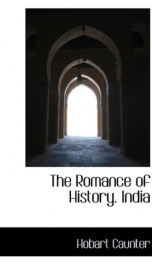the romance of history india

Purchase of this book includes free trial access to www.million-books.com where you can read more than a million books for free. This is an OCR edition with typos. Excerpt from book: CHAPTER I. BOY," said Sam to his son Eiz-ood-Deen, " I'm sadly tired oi this banishment. One's own country, after all, is the only paradise upon earth, and to be exiled from it is a sad penalty to a patriotic heart." " But," replied the son, "you entered this land of strangers under poverty and bereavement; you have here raised yourself to distinction and wealth; your adopted country has been more favourable to you than your fatherland; why, therefore, should you seek to quit these hospitable shores for those from which you were once spurned a beggar and an outcast ?" " Because the yearnings of nature are too strong to be resisted. Besides, there I am known to belong to the blood of her kings ; here I am looked upon as a mere trafficker in merchandise, upon which, indeed, I have grown rich, but in a manner that ill becomes the offspring of royalty." " I have been too long accustomed to consider this as my native land to desire to seek another home ; but the desires of the son ought to yield to those of the father: I am, therefore, content to quit it whenever you may deem it fitting." The merchant Sam was, in truth, son of the king of Ghoor, a mountainous region, which finally became tributary to Ghizny, and had been obliged to fly from his country on the death of his father, who, while attacking a fort, was killed by an arrow, which entered his eye. The son fled into India, and finally settled atSurat, a city of considerable commercial importance, about twelve coss from the sea. Being of an enterprising turn of mind, he assumed the business of a merchant, and, in the course of a few years of successful traffic, became a man of great wealth. Although he found few Mahomedans at Surat, there were a number of old Parsee families, who had fixed their abode in a certai... --This text refers to an alternate Paperback edition.
Info about the book
Author:
Series:
Unknown
ASIN:
B004G2DX98
Rating:
3.5/5 (4)Your rating:
0/5
Languge:
English
Users who have this book
Users who want this book
What readers are saying
What do you think? Write your own comment on this book!
write a commentGenre
if you like the romance of history india try:
Do you want to read a book that interests you? It’s EASY!
Create an account and send a request for reading to other users on the Webpage of the book!



